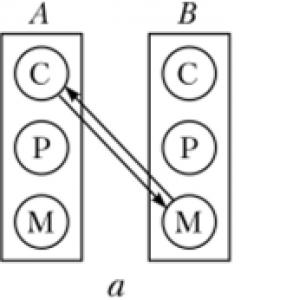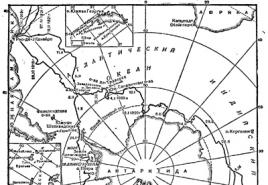Zhdan A.N. History of Psychology: A Textbook
In the 19th century, psychology becomes an independent science. The separation of psychology into an independent science takes place in the 60-70s of the XIX century. At this time, special research institutions were born - psychological laboratories and institutes, departments in higher educational institutions, and an experiment was introduced to study mental phenomena. The first version of experimental psychology as an independent scientific discipline was the physiological psychology of a German scientist W. Wundt, the creator of the world's first psychological laboratory (Leipzig, 1879, later it grew into the Institute of Experimental Psychology). He believed that in the field of consciousness there is a special psychic causality that is subject to scientific objective research. (The method of introspection is the first expert in the scientific method of psychology, the first laboratory, experiments, the psyche of the masses and the psychology of peoples).
Wundt developed the following rules for experimental research:
1) observers must correctly determine the moment of the beginning of the experiment;
2) observers should never lower their level of attention;
3) the experiment should always be organized in such a way that it can be carried out several times;
4) the experimental conditions should be acceptable for changes and control of stimuli
Follower of Wundt E. Titchener, American psychologist, was the founder structural psychology. It is based on the idea of elements of consciousness (sensations, images, feelings) and structural relationships. The structure, according to Titchener, is revealed by introspection - the subject's observation of the acts of his own consciousness.
The founder of Russian scientific psychology is considered THEM. Sechenov... In his book "Reflexes of the brain" basic psychological processes receive a physiological interpretation. Their scheme is the same as that of reflexes: they originate in external influence, continue with central nervous activity and end in response activity - movement, deed, speech. With this interpretation, Sechenov attempted to "wrestle" psychology from the circle of a person's inner world. However, at the same time, the specificity of mental reality was underestimated in comparison with its physiological basis, the role of cultural and historical factors in the formation and development of the human psyche was not taken into account.
An important place in the history of Russian psychology belongs G.I. Chelpanov... His main merit lies in the creation of a psychological institute in Russia. Experimental direction in psychology using objective research methods developed V.M. Bekhterev.
Efforts I.P. Pavlova were aimed at studying conditioned reflex connections in the activity of the organism. His work fruitfully influenced the understanding of the physiological foundations of mental activity. Nevertheless, I.P. Pavlov did not create.
20th century
At the beginning of the twentieth century, a crisis situation arises in psychology: the method of introspection did not give noticeable results; it was not possible to clarify the specifics of psychic reality, to solve the problem of the connection between physiological and psychic phenomena; a significant gap between psychological theory and the data of experimental work was revealed. Attempts to overcome this crisis have led to the creation of several influential schools (directions) in psychological science: behaviorism, gestalt psychology, psychoanalysis.
Gestalt psychology originated in Germany thanks to the efforts of scientists T. Wertheimer, W. Koehler and K. Levina who put forward a program for studying the psyche from the point of view of holistic structures ( gestalts). Gestalt psychology opposed the associative psychology of W. Wundt and E. Titchener, who interpreted complex physical phenomena as built from simple associations according to the laws. Concept of gestalt(translated from German, the word "gestalt" means "form", "image") originated in the study of sensory formations, when the "primacy" of their structure in relation to the components (sensations) included in these formations was discovered. For example, although a melody, when performed in different keys, evokes different sensations, it is recognized as the same. Thinking is interpreted in a similar way: it consists in discretion, awareness of the structural requirements of the elements of a problem situation and in actions that meet these requirements. The construction of a complex mental image occurs in insight- a special mental act of instant "grasping" of relations (structure) in the perceived field. Gestalt psychology also contrasted its positions with behaviorism, which explained the behavior of the organism in a problem situation by busting "blind" trial engines that only accidentally lead to success. The merits of Gestalt psychology are in the development of the concept of a psychological image, in the approval of a systematic approach to mental phenomena.
At the origins psychoanalytic directions stood an Austrian psychiatrist and psychologist Z. Freud... Starting his research not only as a physiologist, but also as a neuropathologist, Freud came to the conclusion that the physiological approach to the psyche was insufficient and proposed his own system for analyzing human mental life, which he called psychoanalysis... According to Freud's teachings, the psyche contains three formations: "I", "Super-I", "It". The last two systems are localized in the layer of the primary mental process - in the unconscious. "It" is a place where two groups of drives are concentrated: a) the drive for life (Eros), which includes sexual drives and drives for self-preservation of the "I", b) the drive for death, for destruction (Thanatos). In ancient Greek mythology, the god Eros symbolized love, the god Thanatos - death. "It" constitutes the driving force of behavior, a source of psychic energy, a powerful motivational principle. "I" is a secondary, surface layer of the mental apparatus, usually called consciousness. "I" perceives information about the world around and the state of the organism. Its main function is to commensurate the aforementioned drives with the requirements of the social sphere hostile to the individual in the interests of his self-preservation. The system of requirements of "I" to "It" is constituted by the "Super-I" - the inner "overseer", "critic", the source of moral self-restraint of the individual. This layer of the psyche is formed mostly unconsciously in the process of education (primarily in the family) and manifests itself in the form of conscience.
Dynamically, these levels of personality are characterized by a conflict between the conscious and the unconscious. Unconscious drives, according to Freud, "by their nature are worthy of condemnation", are suppressed by the energy "Super - I", which creates an unbearable stress for a person. The latter can be partially removed with the help of unconscious defense mechanisms - displacement, rationalizing, sublimation and regressions... The task of the psychoanalyst as a psychotherapist is seen by Freud in identifying, through the analysis of freely emerging associations and dreams of the patient, traumatic experiences, and then helping him to become aware of them and, therefore, to get rid of them.
The methodological prerequisites for the formation of psychology as a science were mainly prepared by those currents associated with empirical philosophy that proclaimed in relation to the cognition of psychological, like all other, phenomena the need to turn from speculation to experimental knowledge, carried out in natural science in relation to the cognition of physical phenomena. In this respect, a special role was played by the materialist wing of the empirical trend in psychology, which linked mental processes with physiological ones.
The first version of psychology as an independent science was the physiological psychology of W. Wundt (1832-1920). He began his research in the field of perception. In Lectures on the Soul of Man and Animals, published in 1863, Wundt, together with the test, names the analysis of the goods of the human spirit as a source of psychic research. So, by the beginning of the 60s. a program of psychology is being formed, combining two methods - experimental and cultural-historical. Wundt's Foundations of Physiological Psychology, published in 1874, were the beginning of psychology as an independent science. Its object is declared to be those processes that are immediately accessible to both external and internal observation and have both a physiological and a mental side and therefore cannot be explained either by physiology or only by psychology: these are feelings and simple feelings. Immediately with Wundt in Russia, I.M.Sechenov made a program for the construction of psychology. The result of Sechenov's work was a new understanding of the psyche and the tasks of psychology as a science. Sechenov can rightfully be considered the founder of Russian scientific psychology.
An important place in the history of Russian psychology belongs to G.I. Chelpanov. His main merit is the creation of a psychological institute in Russia. The experimental direction in psychology with the use of objective research methods was developed by V.M.Bekhterev. The efforts of I.P. Pavlov were aimed at studying conditioned reflex connections in the activity of the organism. His work significantly influenced the understanding of the physiological foundations of mental activity.
The history of the formation of psychology as a science can be viewed as a series of various crises. The first associative programs for constructing psychology on the model of the natural sciences (physics, chemistry) quickly revealed their limitations. Theological and mystical concepts of the psyche for a number of reasons were taken out of the scope of scientific knowledge. As a result of the first open crisis, new directions emerged (behaviorism, psychoanalysis, gestalt psychology, the French sociological school that understands psychology). Each of them opposed the basic provisions of traditional psychology, the foundations of which were laid back in the 17th century by Descartes and Locke. But the general drawback of these directions was that they mostly opposed only one of its aspects: psychoanalysis criticized the identification of the psyche with consciousness, behaviorism did not accept the subjectivity of the subject of classical psychology and the method of introspection and declared the subject of psychology to be accessible to objective observation of behavior, the French sociological school opposed the individualism of associative psychology, Gestalt psychology refuted the sensationalism and atomism of the former psychology. As a result, each of the schools, as its research program, developed only one of the blocks of the categorical apparatus of psychology, which resulted in the disunity of psychological schools in the 20th century.
Currently, psychology is at a turning point in its development. The definition of its state as a protracted crisis is due to the exhaustion of the primary, empirical programs for its construction. The condition for the further development of psychology is the analysis of the nature and status of psychological knowledge within the framework of philosophy and methodology of cognition.
The separation of psychology into an independent science and its development until the period of open crisis ((60s of the 19th century - 10s of the 20th century)
 The first programs in psychology q Wilhelm Wundt (1832 -1920) o various sciences dealt with mental phenomena. A person was needed who could collect this knowledge into one area. Wilhelm Wundt became such a person. o the subject of psychology, according to Wundt, is consciousness; method of self-observation o self-observation, according to Vtu, the only direct method in psychology. But Wundt also takes into account the experiment o Wundt limited the experiment to the area of the simplest mental processes of sensations, representations, reaction time, the simplest associations and feelings. This limitation is associated with a peculiarity of Wundt's understanding of the experiment: it was not a psychological, but a psychophysical and psychophysiological experiment aimed at a systematic change in a material stimulus and objective registration of the effect associated with it. o The main goal of Wundt was to find out how our consciousness is arranged, what is the structure of consciousness. Such a position of a scientist who sees the goal of knowing the structure of a phenomenon is called structuralism. o In 1879, Wundt opened the first psychological laboratory at the University of Leipzig. This year is considered to be the year of foundation of psychology as an independent science.
The first programs in psychology q Wilhelm Wundt (1832 -1920) o various sciences dealt with mental phenomena. A person was needed who could collect this knowledge into one area. Wilhelm Wundt became such a person. o the subject of psychology, according to Wundt, is consciousness; method of self-observation o self-observation, according to Vtu, the only direct method in psychology. But Wundt also takes into account the experiment o Wundt limited the experiment to the area of the simplest mental processes of sensations, representations, reaction time, the simplest associations and feelings. This limitation is associated with a peculiarity of Wundt's understanding of the experiment: it was not a psychological, but a psychophysical and psychophysiological experiment aimed at a systematic change in a material stimulus and objective registration of the effect associated with it. o The main goal of Wundt was to find out how our consciousness is arranged, what is the structure of consciousness. Such a position of a scientist who sees the goal of knowing the structure of a phenomenon is called structuralism. o In 1879, Wundt opened the first psychological laboratory at the University of Leipzig. This year is considered to be the year of foundation of psychology as an independent science.
 q William James (James) (1842 -1910) It seemed to him that it was necessary to consider consciousness not from the point of view of structure, but from the point of view of the role it played in evolution and continues to play in the life of modern man. o "The concept of mental automatism" W. James explains the reasons o o o 1) 2) 3) 4) the emergence of consciousness. Consciousness is a product of a later stage of evolution. The lower animals did not have consciousness, since the organism adapted to the environment due to physiological automatisms. As the environment becomes more complex (animals emerge on land), this adaptation mechanism does not effectively cope with its function. That. the ability to reflect the environment and react to it is developed, to adapt to it not in the material, but in the ideal plan. Characteristics of consciousness according to James: the integrity of consciousness fluidity selectivity of consciousness (we do not need all the information coming from the environment) (introspection finding of James) any element of consciousness is perceived by consciousness as belonging to him personally = which means that our consciousness is a person (this is the first theory of personality ).
q William James (James) (1842 -1910) It seemed to him that it was necessary to consider consciousness not from the point of view of structure, but from the point of view of the role it played in evolution and continues to play in the life of modern man. o "The concept of mental automatism" W. James explains the reasons o o o 1) 2) 3) 4) the emergence of consciousness. Consciousness is a product of a later stage of evolution. The lower animals did not have consciousness, since the organism adapted to the environment due to physiological automatisms. As the environment becomes more complex (animals emerge on land), this adaptation mechanism does not effectively cope with its function. That. the ability to reflect the environment and react to it is developed, to adapt to it not in the material, but in the ideal plan. Characteristics of consciousness according to James: the integrity of consciousness fluidity selectivity of consciousness (we do not need all the information coming from the environment) (introspection finding of James) any element of consciousness is perceived by consciousness as belonging to him personally = which means that our consciousness is a person (this is the first theory of personality ).
 Development of experimental and applied areas of psychology § The separation of psychology into an independent science was accompanied by intensive development of experimental research. Psychological laboratories and institutes for experimental and applied research are being set up in all countries. § Discussions arise about the place and purpose of the experiment, during which it turns out that some psychologists are turned to physiology and natural science, and some - to the sciences of the spirit, to history, to sociology. That. there is a split of psychology Ø into natural-scientific, basically materialistic Ø and historical, understanding, idealistically directed. § In Germany, the experiment has been extensively developed. It spread to the study of complex mental processes - memory, thinking, will - this leads to the development of applied psychology. The greatest development was received by medical psychology, pedagogical. Less - research in the field of trade, industry, social life. q Hermann Ebbinghaus (1850 -1909) studied memory. o Introduced 2 methods of studying memory: the memorization method and the saving method. o Ebbinghaus established the following facts: the volume of direct memorization, the "forgetting curve", the "edge factor", the difference between memorizing meaningful and meaningless material.
Development of experimental and applied areas of psychology § The separation of psychology into an independent science was accompanied by intensive development of experimental research. Psychological laboratories and institutes for experimental and applied research are being set up in all countries. § Discussions arise about the place and purpose of the experiment, during which it turns out that some psychologists are turned to physiology and natural science, and some - to the sciences of the spirit, to history, to sociology. That. there is a split of psychology Ø into natural-scientific, basically materialistic Ø and historical, understanding, idealistically directed. § In Germany, the experiment has been extensively developed. It spread to the study of complex mental processes - memory, thinking, will - this leads to the development of applied psychology. The greatest development was received by medical psychology, pedagogical. Less - research in the field of trade, industry, social life. q Hermann Ebbinghaus (1850 -1909) studied memory. o Introduced 2 methods of studying memory: the memorization method and the saving method. o Ebbinghaus established the following facts: the volume of direct memorization, the "forgetting curve", the "edge factor", the difference between memorizing meaningful and meaningless material.
 § In Russia, psychiatrists stood at the origins of experimental psychology. § In the 80s of the 19th century, they organized experimental psychological laboratories at psychological clinics (in Kazan, and then in St. Petersburg V.M.Bekhterev; in Moscow - Sergei Sergeevich Korsakov (1854-1900 Russian psychiatrist), A.A. Tokarsky ; in Kharkov - P. I. Kovalevsky; Kiev - I. A. Sikorsky; in Derkt (Tartu) - E. Krepelin, V. F. Chizh, etc.) ü various types of sensations (visual, auditory, muscle, temperature, pain), perception ü motor reactions, attention, memory, hypnotism phenomena, emotions ü influence of different conditions on mental and muscular performance. § That. over the 50 years of existence of psychology as an independent science, new factual material has been accumulated, new methods and techniques of research have appeared. § New scientific fields have emerged - pedology, psychotechnics, defectology, differential psychology. There were contradictions with the already existing psychological knowledge. Psychology as a science developed, but on the whole it lagged behind the demands of practice, and theory developed independently of it; § At the beginning of the 10s of the 20th century, psychology entered a new period of its development - a period of open crisis, which lasted until the mid-30s.
§ In Russia, psychiatrists stood at the origins of experimental psychology. § In the 80s of the 19th century, they organized experimental psychological laboratories at psychological clinics (in Kazan, and then in St. Petersburg V.M.Bekhterev; in Moscow - Sergei Sergeevich Korsakov (1854-1900 Russian psychiatrist), A.A. Tokarsky ; in Kharkov - P. I. Kovalevsky; Kiev - I. A. Sikorsky; in Derkt (Tartu) - E. Krepelin, V. F. Chizh, etc.) ü various types of sensations (visual, auditory, muscle, temperature, pain), perception ü motor reactions, attention, memory, hypnotism phenomena, emotions ü influence of different conditions on mental and muscular performance. § That. over the 50 years of existence of psychology as an independent science, new factual material has been accumulated, new methods and techniques of research have appeared. § New scientific fields have emerged - pedology, psychotechnics, defectology, differential psychology. There were contradictions with the already existing psychological knowledge. Psychology as a science developed, but on the whole it lagged behind the demands of practice, and theory developed independently of it; § At the beginning of the 10s of the 20th century, psychology entered a new period of its development - a period of open crisis, which lasted until the mid-30s.
Discipline: Psychology
Kind of work: Coursework
Topic: Singling out psychology as an independent science
Course work
"Separation of psychology into an independent science"
Introduction 3
Chapter 1. Periodization of the history of psychological science 6
Chapter 2. Formation and development of empirical psychology as
science. Natural scientific prerequisites for the design of psychology 10
Chapter 3. Formation of psychology as an experimental science 14
Chapter 4. Methodological aspects of the formation of psychology
as science 18
Conclusion 23
List of used literature 25
Introduction
The transition from knowledge to science, which for a number of areas should be attributed to the 18th century, and for some, for example, mechanics - as far back as the 17th century, in psychology was completed by the middle of the 19th century. It was only by this time that diverse psychological knowledge took shape into an independent science, armed with its own research methodology, specific to its subject, and possessing its own system, i.e. the logic of constructing knowledge related to it, specific to its subject.
The methodological prerequisites for the formation of psychology as a science were mainly prepared by those currents associated with empirical philosophy that proclaimed in relation to the cognition of psychological, like all other, phenomena the need to turn from speculation to experimental knowledge, carried out in natural science in relation to the cognition of physical phenomena. In this respect, a special role was played by the materialist wing of the empirical trend in psychology, which linked mental processes with physiological ones.
However, in order for the transition of psychology from more or less substantiated knowledge and views to science to really take place, it was also necessary to develop the scientific fields on which psychology should rely, and to develop appropriate research methods. These last preconditions for the formation of psychological science were provided by the work of physiologists in the first half of the 19th century.
The separation of psychology into an independent science took place in the 60s of the 19th century. It was associated with the creation of special research institutions - psychological laboratories and institutes, departments in higher educational institutions, as well as with the introduction of an experiment to study mental phenomena. The first version of experimental psychology as an independent scientific discipline was the physiological psychology of the German scientist W. Wundt, the creator of the world's first psychological laboratory. In the field of consciousness, he believed, a special psychic causality operates, subject to scientific objective research.
I.M.Sechenov is considered the founder of Russian scientific psychology. In his book "Reflexes of the Brain", the main psychological processes received a physiological interpretation. Their scheme was determined by analogy with reflexes: they originate in external influence, continue with central nervous activity and end in response activity - movement, deed, speech. With this interpretation, M. Sechenov made an attempt to "pull out" psychology from the circle of the inner world of man. However, at the same time, the specificity of mental reality was underestimated in comparison with its physiological basis, the role of cultural and historical factors in the formation and development of the human psyche was not taken into account.
An important place in the history of Russian psychology belongs to G.I. Chelpanov. His main merit is the creation of a psychological institute in Russia. The experimental direction in psychology with the use of objective research methods was developed by V.M.Bekhterev. The efforts of I.P. Pavlov were aimed at studying conditioned reflex connections in the activity of the organism. His work significantly influenced the understanding of the physiological foundations of mental activity.
This course work is devoted to the problems of the formation of psychology as an integral science.
The purpose of the work is to present various preconditions and aspects of the design of psychology as a scientific discipline.
The subject of work is psychology as a theoretical and empirical science.
The object of work is a transforming and changing system of views on psychology as a science.
In accordance with the goal in the process of writing, the following tasks were solved:
The chronological framework is highlighted that determine the period of development of psychology as an independent science,
The analysis of the natural-scientific prerequisites for the formation of psychology as a science is made, the starting points of the formation of empirical psychology are highlighted,
A description of a number of methodological features of the formation of psychological science is given.
Chapter 1. Periodization of the history of psychological science
Psychology has a long history: the first scientific concepts emerged in the 6th century BC. Therefore, the question arises of the periodization of the history of psychology, the task of which is to dismember this process, highlight the stages, and determine the content of each of them.
In the history of psychology, there are two large periods: the first, when psychological knowledge developed in the depths of philosophy, as well as other sciences, primarily natural science; the second - when psychology developed as an independent science. They are incommensurable in time: the first period (6th century BC - mid-19th century) covers about 2.5 thousand years, the second - a little more than a century; (mid-19th century - present). According to G. Ebbinghaus, psychology has a long past, but a very short history1. The allocation of these two periods does not require special justification, since its criteria are obvious, but since each of them stretches over centuries, a more fractional periodization is necessary. It can be carried out on purely formal grounds - chronological (one can distinguish between the history of psychology of the 17th century, the history of psychology of the 18th century, etc.), one can distinguish between the periodization of world and Russian psychology. Taking into account the conventionality of any periodization and taking into account the undeveloped nature of this problem, the proposed periodization of the history of psychology should be considered only as one of its possible variants. In it, the history of Russian psychological thought is included as an integral part in the history of the development of world science. As a basis for dividing this process into stages, Zhdan A.N. substantive criteria were selected that determined the change in views on the nature of the mental and that distinguish each of the stages (see Table 1.1.) 2.
Table 1.1.
Periodization of the development of psychology as a science
DEVELOPMENT OF PSYCHOLOGY WITHIN THE FRAMEWORK OF PHILOSOPHY
Chronology
Subject of study
The most important results
VI century BC. - V century.
The formation of two directions - materialism and idealism - in explaining the origin and manifestations of the soul. The first empirical knowledge about mental processes and phenomena - sensation (perception), memory, imagination, thinking, affects, will, character, special states (sleep, ecstasy).
Highlighting problems: "soul and body"; "Congenital - acquired". Indication of inner feeling as a way of knowing the soul
Development of the doctrine of the soul within the framework of philosophical teachings and on the basis of medical knowledge
Formation of Thomistic psychology. Beginning of experimental research methodology
XIV - XVI centuries.
Further development of the doctrine of the soul in the context of the development of anatomophysiological knowledge and great discoveries of the XIV-XVI centuries.
Rejection of the soul as a subject of research and explanatory principle of bodily and mental phenomena.
Introduction of the term "psychology"
XVII - mid. XIX centuries.
Inner experience as a phenomenon of consciousness given to self-observation
Formation of empirical introspective and asocyanistic psychology.
The concept of the unconscious psyche.
DEVELOPMENT OF PSYCHOLOGY AS AN INDEPENDENT SCIENCE
Beginning XIX - b0s XIX century.
The activity of the nervous system and sensory organs. The relationship between physical and mental. Measuring the speed of mental processes
Formation of natural scientific prerequisites for psychology as an independent science.
Experimental method.
Facts and theories of sensation and perception.
Formation of psychophysics.
Formation of psychometrics.
Reflex teaching
60s XIX century. - the end of the 19th century.
The immediate content of the experience. Mental acts and mental functions. Mind and consciousness in connection with their adaptive function in behavior
Penetration of experimental methods into psychology.
Formation of theoretical programs of psychology.
The split of psychology into an individual physiological, oriented
on natural science, and spiritual and scientific, focused on history and culture.
The emergence of applied research in psychology.
The emergence of new areas of psychology
10s - ser. 30s XX century.
Behavior. Holistic mental structures. The unconscious. Consciousness in its socio-historical conditioning. The semantic structure of mental life in relation to the values that have arisen historically. Installation. Development of higher mental functions. Psychological activity research
Open crisis in psychology.
The emergence of schools in foreign science: behaviorism, psychoanalysis, gestalt psychology, the French sociological school, understanding psychology, individual psychology, analytical psychology, etc.
The emergence of Soviet psychology: attitude theory, behavioral trends, cultural-historical theory, activity theory.
The development of psychotechnics and pedology in the Russian
and foreign psychology.
Development of natural scientific ideas about the physiological mechanisms of mental activity and motor acts.
The emergence of the problem "psychology and Marxism"
Late 30s - 50s XX century.
Evolution within the framework of the basic approaches of the previous period
Evolution of scientific schools during the period of open crisis.
Non-behaviorism, neo-Freudianism. The emergence of new
branches and directions: genetic psychology,
personalistic concepts of personality, etc.
Discussions in Soviet psychology (on the restructuring of science on the basis of Pavlov's doctrine, on the theory of attitudes).
Development of the theory of activity in Soviet psychology
60s XX century. - the end of the XX century.
Continued development of previously identified subject areas. Orientation process. Cognitive structures and their role in behavior. Personality
The emergence of new directions in foreign psychology: humanistic psychology, logotherapy, cognitive psychology.
The emergence of the theory of the stage-by-stage formation of mental actions and concepts in Soviet science.
Discussions in Soviet psychology on the subject of psychology, on the problems of the unconscious, communication, etc.
Chapter 2. Formation and development of empirical psychology as a science. Natural scientific prerequisites for the design of psychology
The formation of empirical psychology is associated with the ideas of F. Bacon, W. Hobbes, D. Locke that the phenomena of consciousness are the area that should replace the concept of the soul. D. Locke formulated the concept of inner experience as a new subject of psychological research. A new direction of research appears, in which the phenomena of consciousness are recognized as the only subject of study. All psychology as an independent science developed on the basis of this concept (this line was most developed in French materialism). Philosophically, the basic concepts of this trend are associated with the names of D. Locke, W. Hobbes, R. Descartes and F. Bacon. Since the middle of the 19th century, the separation of psychology as an independent science (as an empirical science of consciousness) is associated with the names of W. Wundt, E. Titchener, W. James, F. Brentano, G.I. Chelpanova.
The main issues in this area were the following:
The concept of experienced, not innate sources of consciousness. D. Locke's thesis about the soul as a tabula rasa is applicable exclusively to the phenomena of consciousness. The content that we acquire with the help of our consciousness is formed during life, therefore, in the soul there is no experience, knowledge, outside the experience gained. Experience was understood as individual, passive (the impact of the external world). The explanation of the phenomena of consciousness comes from consciousness itself, that is, more complex ones are explained from simpler formations of consciousness. Consciousness is closed in itself and its description and explanation do not go beyond the framework of consciousness itself. Here the question arises about the mechanisms of the work of consciousness, solved by D. Locke as follows:
the mechanism of association (the own mechanism of consciousness, in some way reflecting external relations with respect to a person, which, due to repetition, become facts of the subject's consciousness;
own acts of the mind (the act of generalization, for example).
In such a closed structure, there is a problem of mechanisms, laws that act when such connections arise (especially in W. Wundt). The only adequate method for obtaining scientific knowledge about consciousness is introspection (later supplemented by W. Wundt with the method of experiment, as well as the study of the phenomena of the development of the human spirit - speech, myths, customs, etc.).
Thus, empirical psychology develops as experimental knowledge about the phenomena of consciousness (including the study of association processes, etc.). Immediately there are fundamental difficulties in the approach of empirical psychology indicated by W. Leibniz: the impossibility of presenting the soul as a "blank slate". In the soul already from birth there are some germs, the makings of knowledge, that is, something innate, which already after birth is developed. This is a criticism of the basic concept of the empirical approach. Also W. Leibniz, recognizing the importance of experience as forming consciousness, protested against the passivity of consciousness, demanding apperception (activity due to which external phenomena become facts of our consciousness; that which joins perception).
Also W. Leibniz did not agree with the position of the identity of all mental phenomena to consciousness. Leibniz was the first to introduce the concept of the unconscious on the basis of the general law of continuity, which he extended to the entire universe.
On the one hand, empirical psychology was the main form of the development of psychological knowledge at this time (there was also a rationalistic, scholastic tradition going from Thomas Aquinas, which also developed, but rather narrowly and ended in the 18th century in the philosophy of H. Wolf), but its development was extremely controversial.
L.S. Vygotsky pointed out that empirical psychology is confused with empiricism as the absence of theory. But empirical psychology is a theory, a definite concept, which is based on the idea of D. Locke and R. Descartes about consciousness, about the main characteristics and sources of understanding this consciousness.
At the beginning of the 19th century, new approaches to the psyche began to take shape. Since that time, not mechanics, but physiology stimulated the growth of psychological knowledge. Having a special natural body as its subject, physiology turned it into an object of experimental study4. At first, the guiding principle of physiology was "anatomical origin" 5. Functions (including mental ones) were investigated from the point of view of their dependence on the structure of the organ, its anatomy. Physiology translated the speculative views of the previous era into the language of experience.
Thus, the reflex scheme of R. Descartes, fantastic in its empirical texture, turned out to be plausible due to the detection of differences between sensitive (sensory) and motor (motor) nerve pathways leading to the spinal cord. The discovery belonged to I. Prochazka, F. Magendi and C. Bell. It made it possible to explain the mechanism of the connection of nerves through the so-called reflex arc, the excitation of one shoulder of which naturally and inevitably triggers the other shoulder, generating a muscle reaction. Along with scientific (for physiology) and practical (for medicine), this discovery had an important methodological significance. It empirically proved the dependence of the functions of the organism, concerning its behavior in the external environment, on the bodily substrate, and not on the consciousness (or soul) as a special incorporeal entity.
The second discovery, which undermined the version of the existence of the soul, was made during the study of the senses, their nerve endings. It turned out that no matter what stimuli are applied to these nerves, the result will be the same effect specific to each of them.
On this basis, the German physiologist I. Müller formulated the "law of specific energy of the sense organs": the nervous tissue does not possess any other energy, except for the known physics. I. Müller's conclusions strengthened the scientific outlook on the psyche, showing the causal dependence of its sensory elements (sensations) on objective material factors - an external stimulus and properties of the nervous substrate6.
Another discovery confirmed the dependence of the psyche on the anatomy of the central nervous system and formed the basis for the immensely popular phrenology. The Austrian anatomist F. Gall proposed a "brain map" according to which various abilities are "located" in certain parts of the brain. This, according to F. Gall, affects the shape of the skull and allows, by feeling it, to determine by the “bumps” how developed the mind, memory and other functions of a given individual are7. Phrenology, for all its fantastic nature, prompted an experimental study of the localization of mental functions in the brain.
F. Gall's views were criticized from various positions. Idealists attacked him for undermining the postulate of the unity and immateriality of the soul. The French physiologist and physician P. Flourens, without departing from the doctrine of the brain as an organ of thought, showed that phrenology does not stand up to experimental verification. Using the technique of removing individual parts of the central nervous system, and in some cases acting on the centers with drugs, P. Flurance came to the conclusion that the main mental processes - perception, intellect, will - are a product of the brain as an integral organ. The cerebellum coordinates movements, in the medulla oblongata there is a "vital node", vision is associated with the quadruple, the function of the spinal cord is to conduct excitation along the nerves. Flurance's work was instrumental in the destruction of phrenology created ...
Pick up fileIn the second half of the XIX century. objective conditions are created for the separation of psychology into an independent science. In foreign and domestic science, the idea of the need for an independent development of psychology, separate from philosophy and natural science, within the framework of which psychological thought arose, is increasingly common.
The idea that one of the conditions for psychology to achieve independence is its separation from philosophy was expressed by GI Chelpanov in his report at the First All-Russian Congress on Psychoneurology (1923) "On the premises of modern empirical psychology."
The separation of psychology into an independent science took place in the 60s. XIX century. It was marked by the emergence of the first programs (V. Wundt, I. M. Sechenov), the creation of special research institutions - psychological laboratories and institutes, departments in higher educational institutions that began training scientific personnel of psychologists, the publication of special psychological journals, the formation of psychological societies and associations, holding international congresses in psychology.
According to S. L. Rubinstein, the introduction of experiment played a decisive role in the formation of psychology as an independent science. The experiment was borrowed by psychology from natural science (from the physiology of the sense organs and the nervous system). The intensive development of these and other areas of natural science, successes in the field of explaining the phenomena of life (mechanic-physicochemical theory of life, K. Bernard's concept of homeostasis), the emergence of psychophysics and psychometrics were the most important prerequisites for the transformation of psychology into an independent science and determined its development on the model of natural sciences.
27. Teaching about direct experience in. Wundt.
An experiment in psychology became a decisive factor in the transformation of psychological knowledge; it separated psychology from philosophy and turned it into an independent science. Various types of research of the psyche using experimental methods are experimental psychology.
Since the end of the 19th century, scientists have come to grips with the study of elementary mental functions - human sensory systems... At first, these were the first timid steps that laid the foundation for the building of experimental psychology, separating it from philosophy and physiology.
Especially noticeable Wilhelm Wundt(1832-1920), German psychologist, physiologist, philosopher and linguist. He created the world's first psychological laboratory (international center). From this laboratory, which later received the status of an institute, a whole generation of specialists in experimental psychology emerged.
In his first works, W. Wundt put forward a plan for the development of physiological psychology as a special science that uses the method of laboratory experiments to dismember consciousness into elements and to clarify the logical connection between them.
Wundt considered the subject of psychology to be direct experience — phenomena or facts of consciousness accessible to self-observation; however, the higher mental processes (speech, thinking, will), he considered inaccessible to experiment, and proposed to study them by the cultural-historical method.
Initially, the main object of experimental psychology was considered to be the internal mental processes of a normal adult, analyzed with the help of specially organized self-observation (introspection), and then experiments were carried out on animals (K. Lloyd-Morgan, E. Lee Thorndike), the mentally ill, children were studied.
A prerequisite for the emergence of differential psychology, which studies individual differences between people and groups, at the turn of the 19th and 20th centuries was the introduction of experiment, as well as genetic and mathematical methods into psychology.
Currently, the methods of experimental psychology are widely used in various fields of human activity. The progress of human cognition is already unthinkable without the methods of experimental psychology, testing, mathematical and statistical processing of results research. The successes of experimental psychology are based on the use of methods of various sciences: physiology, biology, psychology, mathematics.







